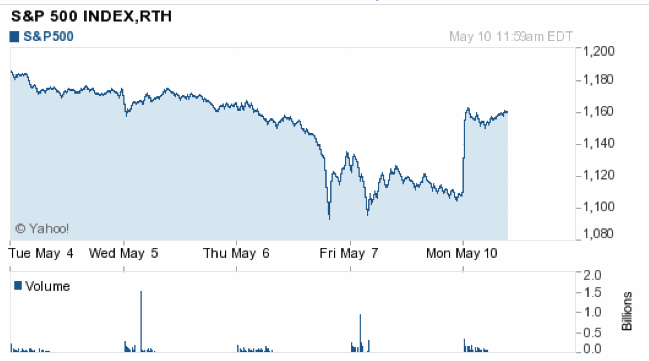audreyh1
Give me a museum and I'll fill it. (Picasso) Give me a forum ...
Oooooh! Here's a good scoop on the "market glitch". Finally something that makes sense!
This firm is already in trouble with the SEC for several things right now:
The whole story is here: Chicago Firm Linked to P&G Trade | TheStreet.com
Yep - all you need it a broker-dealer/clearing house that pulls these stunts (or lets their customers pull these stunts), and no wonder we have horrible market action.
Now, what I can't believe is that there is only one of these "bad apples" out there.
Audrey
NEW YORK (TheStreet) -- The unusual trading action in Procter & Gamble(PG) stock believed to be at the center of the market's most volatile moments on Thursday is thought to have originated from Terra Nova Financial(TNFG), a Chicago-based provider of prime brokerage and clearing services, a person familiar with the situation has told TheStreet.
This firm is already in trouble with the SEC for several things right now:
Terra Nova is apparently already under scrutiny for allegedly lax trading policies and procedures. The company, which is listed on the over-the-counter Bulletin Board under the symbol "TNFG.OB," disclosed in its Form 10-K for fiscal 2009 filed on March 30 that it received a Wells Notice on March 9 from FINRA, alerting the company of a recommendation for disciplinary action against it related to short sales occurring in the October-December 2007 timeframe.
FINRA is alleging that Terra Nova "accepted short sale orders without proper arrangements to borrow the securities" during that period, a practice known as "naked" shorting.
Also in the Form 10-K, Terra Nova disclosed its receipt of a Wells Notice in December 2009 from NYSE Regulation, saying the NYSE is investigating its conduct in four separate matters. The most recent of these is an allegation from September 2008 that a "large volume of erroneous trades" were placed by a Terra Nova client named Hsu-Tung Lee through an automated trading program.
"NYSE alleges that these trades far exceeded Lee's buying power, disrupted the market and indicate that Terra Nova failed to establish or maintain appropriate policies or procedures to prevent such erroneous orders from reaching the market," the filing states.
The other allegations, one of which dates back to January 2005, stem from similar alleged deficiencies in the firm's control policies and procedures related to short sale orders, restrictions on "wash sales and prearranged trades," and possible "spoofing" of the market by a customer who allegedly entered and then cancelled orders prior to the market's open for a two-month period in 2008.
The whole story is here: Chicago Firm Linked to P&G Trade | TheStreet.com
Yep - all you need it a broker-dealer/clearing house that pulls these stunts (or lets their customers pull these stunts), and no wonder we have horrible market action.
Now, what I can't believe is that there is only one of these "bad apples" out there.
Audrey


